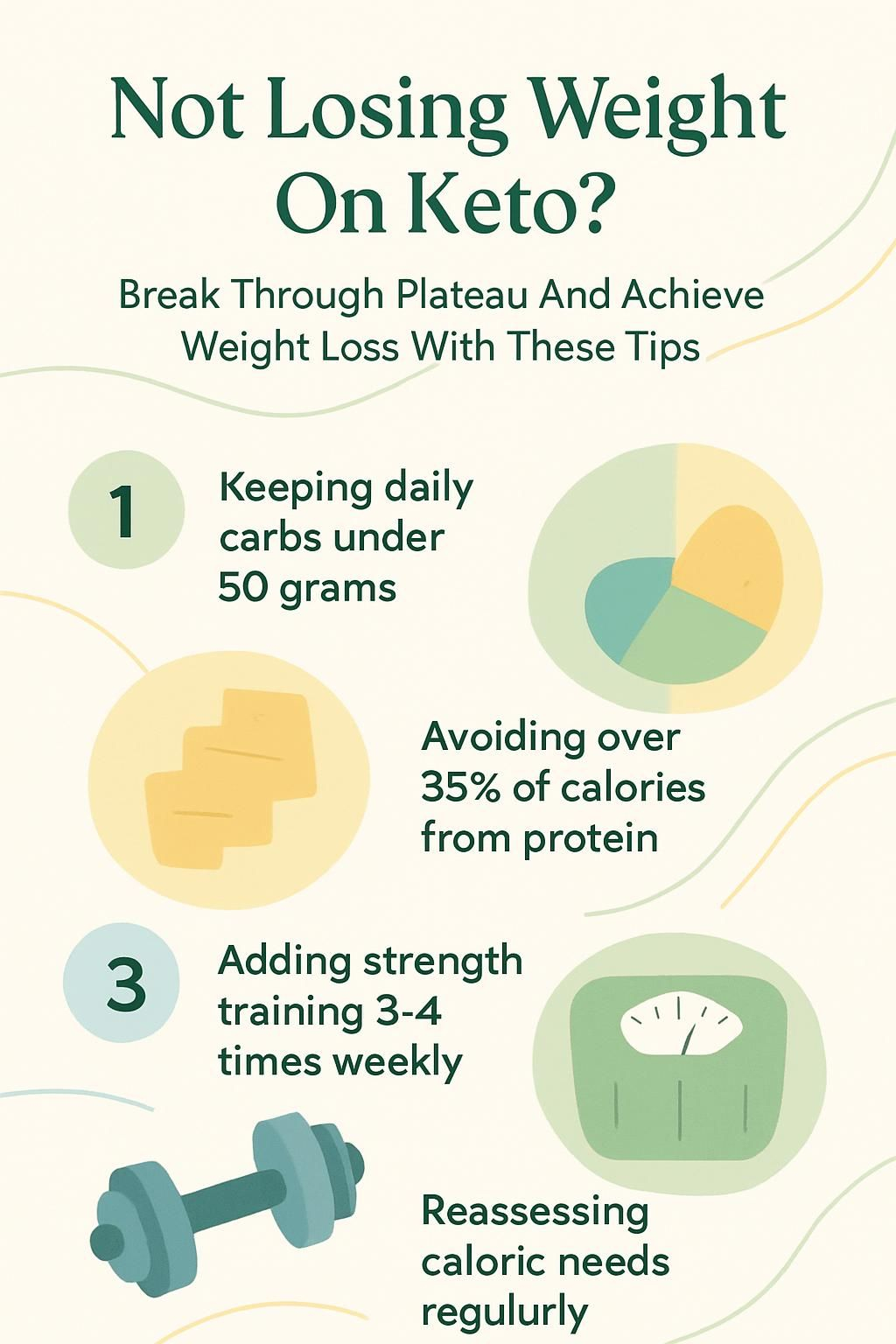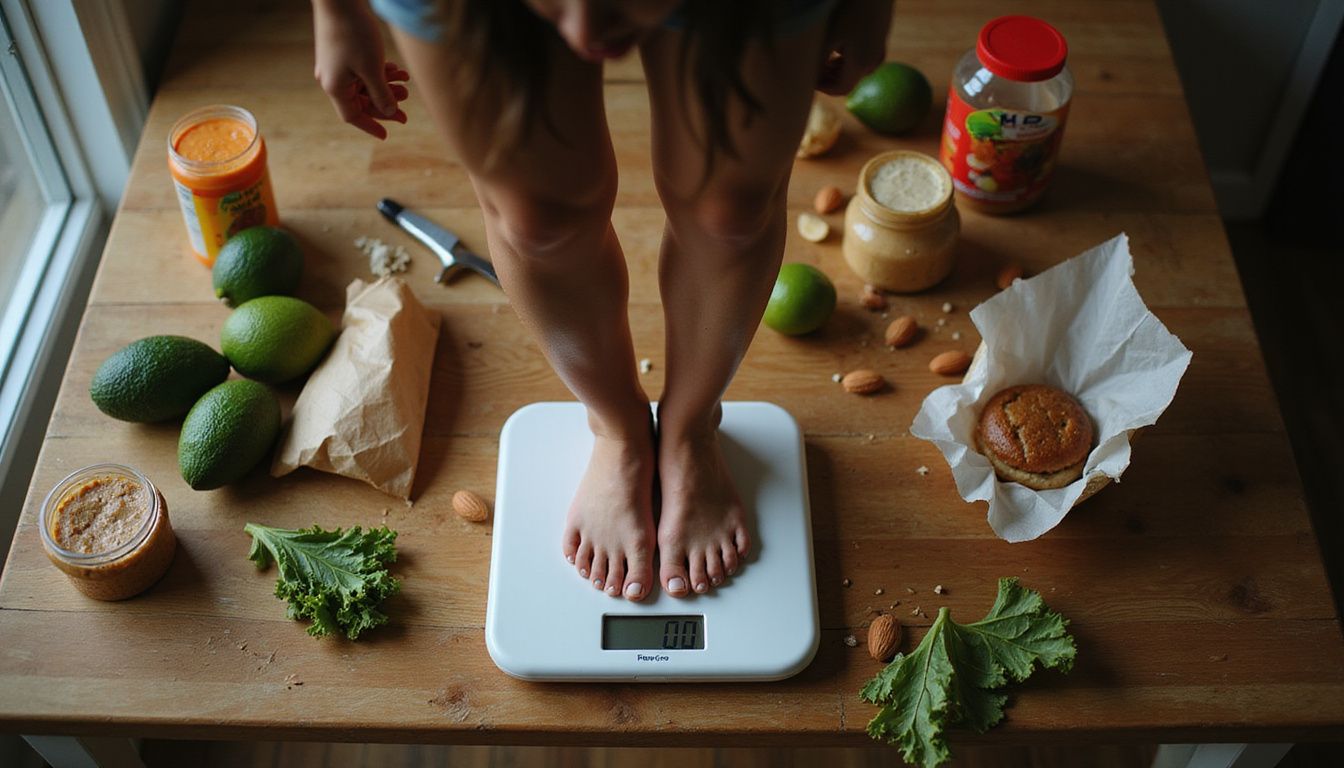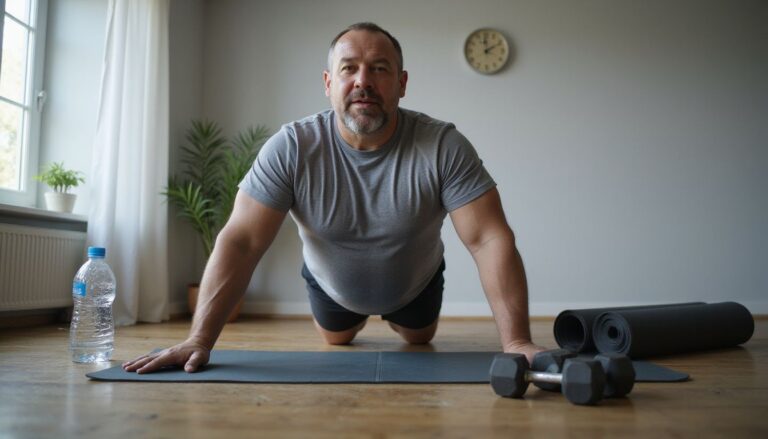Not Losing Weight On Keto? Break Through Plateau And Achieve Weight Loss With These Tips
Our Nutrition Assistant AI Suite will transform your body. You will lose fat, get toned, and build muscle. Gain confidence and optimal health.
Not losing weight on keto can feel discouraging, even when you follow the plan closely. The keto diet aims to shift your body into ketosis, a state where you burn fat for energy instead of glucose. If progress has stalled, small things like hidden carbs, extra calories, or daily habits may be the cause. This guide explains common blockers and how simple fixes can restart healthy weight loss.
Learn practical steps to break through your plateau and move toward your goal.
Key Takeaways
- Log calories and macros with an app to keep carbs under about 50 grams and catch hidden sources.
- Keep protein below roughly 35% of calories, and limit high-calorie snacks such as nuts and cheese.
- Stress, poor sleep, and low activity alter hormones like cortisol, leptin, and ghrelin, which can trigger plateaus.
- Conditions such as hypothyroidism or PCOS, and medications like beta-blockers or corticosteroids, may slow fat loss.
- Rotate fat and protein sources, lift weights 3 to 4 days weekly, use intermittent fasting, and recalc calories as your weight changes.

Common Reasons for Not Losing Weight on Keto

Many people hit a stall on a low-carb diet because key details slip by. Think of ketosis like a light that dims when carbs or calories creep higher than planned.
Am I eating too many carbs for keto?
Eating more than 20 to 50 grams of carbohydrate per day can block ketosis, the fat-burning state. Hidden carbs in sweetened yogurt, tomato sauce, dressings, and some “low-carb” products can add up fast. A typical diet gets 45 to 65 percent of calories from carbs, but keto limits you to about 5 to 10 percent.
Track macros with a mobile app such as MyFitnessPal to keep carbs in range. Blood, breath, or urine ketone tests can confirm you are in ketosis and on track for weight loss.
“Eating more than 50 grams of carbs a day on a 2,000-calorie diet can knock your body out of ketosis and stall weight loss.”
Can consuming too much protein stall my weight loss?
Yes. On keto, protein should stay under about 35 percent of your daily calories. Extra amino acids can turn into glucose through gluconeogenesis, a process where your body makes sugar from protein. That rise in blood sugar can lower ketone levels and slow fat loss.
I saw my progress stall after adding jerky and protein bars every day. Those snacks also raised my calories more than I realized.
Measure both protein and carbohydrate intake. Choose moderate portions of meat, eggs, and dairy, and keep an eye on nuts. Small macro adjustments can bring ketones back up and restart steady fat loss.
Where are hidden carbs found in foods and drinks?
Common sources include tomato sauce, sweetened yogurt, salad dressings, non-dairy milks, and many protein bars labeled “low-carb.” BBQ sauce, beans, quinoa, fruit juice, veggie chips, and sugar-free desserts often carry added sugars or grains.
Even a few spoonfuls can disrupt ketosis if eaten often. Maltitol, a sugar alcohol, can raise blood sugar in larger servings and make fat loss harder.
Get in the habit of reading ingredient lists and nutrition labels. Processed “keto-friendly” items can still lead to excess carbs and extra calories.
How does eating too many calories affect keto weight loss?
Fat loss still requires a calorie deficit. High-fat foods like avocados, nuts, and oils are healthy, but they are energy dense. A few extra handfuls of nuts or heavy pours of olive oil can tip you over your needs.
Portion control matters, even with very low carb intake. Many people hit a plateau after relying on “fat bombs” and cheese without logging calories.
I broke through a stall after weighing portions and logging every bite. Cutting extra snacking made a clear difference within two weeks.
Why is tracking macros important on keto?
Tracking keeps carbs between 20 and 50 grams per day and helps you balance fat and protein. It also reveals hidden carbs in sauces and snacks, plus mindless bites that raise calories.
Use a food journal or app to log meals, especially when you eat out. Consistent records help you make precise changes based on results.
Does drinking alcohol prevent weight loss on keto?
Alcoholic drinks often carry both carbs and calories. A single beer or sugary cocktail can exceed your daily carb target.
Your body burns alcohol first, not fat, which slows progress. Even low-carb choices like dry wine or spirits add calories and may increase cravings and overeating.
Cutting alcohol, or saving it for rare occasions, can help you break a plateau faster.
Lifestyle Factors Affecting Keto Weight Loss
Stress, sleep, and movement shape how your body burns energy. Small daily choices add up over weeks and months.
How does high stress impact my keto progress?
Chronic stress raises cortisol, a hormone linked to belly fat and stronger cravings. That mix makes it harder to stay in a calorie deficit, even if your macros look good.
Stress can also disrupt sleep and lower motivation to exercise. Practices like yoga, meditation, short walks, and reduced screen time can help bring cortisol down.
Lower stress supports steadier eating habits and better fat loss.
Why is inadequate sleep a problem for weight loss?
Sleep loss lowers leptin, the fullness hormone, and raises ghrelin, the hunger hormone. That shift drives you to snack and to choose calorie-dense foods.
Short sleep also reduces insulin sensitivity, which can slow metabolism and fat loss. A 2022 review linked poor sleep with impaired weight loss and a higher risk of obesity.
Prioritize 7 to 9 hours per night. Better sleep supports appetite control, energy, and consistent workouts.
Can a sedentary lifestyle or lack of exercise cause a plateau?
Low activity reduces daily energy burn, which makes a calorie deficit harder. Exercise helps your body use stored fat for fuel.
Strength training builds muscle, which burns more calories at rest. Research shows regular activity also lowers risks tied to heart disease, diabetes, depression, and obesity (Booth FW et al., 2012).
Aim for three to four workouts per week. Laying out your gym clothes the night before can boost consistency.
Medical and Health-Related Reasons
Some health issues and treatments slow fat loss, even with a strict low-carb plan. Knowing this helps you ask the right questions.
What medical conditions can block keto weight loss?
Hypothyroidism, polycystic ovary syndrome (PCOS), Cushing syndrome, depression, and hyperinsulinemia can make weight loss harder. These conditions affect hormones or metabolism, which can blunt fat loss even in ketosis.
If the scale will not move despite careful tracking, ask your clinician about testing. Some conditions need medical treatment along with diet changes.
Can medications cause keto weight loss issues?
Yes. Insulin, sulfonylureas, thiazolidinediones, corticosteroids, and beta-blockers can promote weight gain or stall fat loss. Birth control, hormone therapy, antidepressants, antipsychotics, and antiepileptics may also affect appetite, metabolism, or water retention.
If progress stalls, speak with your healthcare provider or a dietitian. A colleague of mine improved after her doctor reviewed a beta-blocker and adjusted her plan.
Never stop a prescription on your own. Work with your clinician to find safe options for weight management.
How do hormonal imbalances affect weight loss on keto?
Hormone shifts can slow fat loss even with perfect macros. High stress raises cortisol, which increases hunger and encourages fat storage. Poor sleep disrupts leptin and ghrelin, so you feel hungrier and less satisfied.
Thyroid issues and PCOS also influence metabolism. A 2022 peer review linked higher cortisol with greater fat retention in adults on low-carb plans.
Manage stress, improve sleep, and seek medical care when needed. Restoring balance helps keto work as intended.
Breaking Through a Weight Loss Plateau
Plateaus happen, even with strong effort. A few focused changes can raise your burn and move the scale again.
How do I reassess and adjust my caloric intake?
Track everything you eat for at least a week. Include sauces, vegetables, drinks, and calorie-dense keto treats.
As you lose weight, your body needs fewer calories. Try trimming 100 to 200 calories per day and watch trends for two weeks.
Recalculate needs after every five-pound change. Swap high-calorie snacks like nuts or cheese for lower-calorie options. Keep your fat, protein, and carb ratios steady while adjusting total calories.
Adding steps or short workouts can help cover small calorie overages.
What exercises increase metabolism on keto?
Strength training raises resting energy burn by building muscle. Use free weights, machines, or bodyweight moves like squats, lunges, and push-ups three to four times per week.
Combo workouts such as circuits or high-intensity interval training increase calorie burn and support fat loss. Even if the scale moves slowly, body composition often improves.
Lay out your gear ahead of time to make training automatic. Intermittent fasting can pair well with these sessions.
How can intermittent fasting help break a plateau?
Intermittent fasting creates a natural calorie gap and often raises ketone levels. A 16:8 or 18:6 schedule keeps your body in a fat-burning state for more hours each day.
Many people feel less hungry during an eating window, which helps reduce snacking. Fasting can also improve insulin sensitivity and metabolic flexibility.
When I added a 16:8 schedule to keto, hunger dropped and the stall ended within two weeks. Talk with your healthcare provider before starting fasting.
Why should I switch up my fat and protein sources?
Variety improves nutrition and can help with adherence. For example, swap beef for salmon to add omega-3 fats that lower inflammation. Include nuts like almonds or walnuts for fiber to reduce constipation risk.
Rotating foods reduces reliance on processed items that can slow progress. Different fats also affect fullness, which can help with calorie control.
If certain proteins cause bloating, try rotating chicken, eggs, pork, or plant-based options. A Mediterranean-style pattern with varied whole foods supports long-term success.
Tips for Maximizing Keto Weight Loss
Small, steady habits help you stay in ketosis and protect your momentum.
How do I measure and track ketone levels effectively?
Use blood, urine, or breath tests to confirm ketosis. These tools highlight foods or habits that push you out of range, including hidden carbs or very high protein meals.
The California Air Resources Board does not regulate these devices, but many brands are accurate for daily checks. Some people test daily at first, then twice per week once stable.
Track ketones with your macros. Consistent data helps you adjust early and avoid the “starvation response,” which can slow results.
Why is hydration and electrolyte balance important?
Water supports fullness and helps control appetite. Keto often increases water and electrolyte loss, especially early on during the “keto flu.”
Sodium, potassium, and magnesium support heart rhythm, nerves, and muscles. Low levels can cause fatigue, cramps, or headaches.
Add electrolyte-rich foods or use supplements if needed. If workouts increase, drink more to keep energy and appetite steady.
What are the best whole, nutrient-dense keto foods?
Base your meals on unprocessed foods. Full-fat dairy like Greek yogurt and cheese offers protein and fat for steady energy. Eggs provide high-quality protein and key vitamins.
Wild-caught fish such as salmon supplies omega-3s that support healthy cholesterol levels. Pastured meats deliver iron, zinc, and B vitamins. Nuts like walnuts, almonds, and macadamias help with satiety without many carbs.
Leafy greens, broccoli, peppers, and mushrooms add fiber and antioxidants while keeping carbs low. I do better when I choose avocado or olive oil instead of processed oils.
Limiting packaged “keto” snacks reduces hidden sugars and helps prevent nutrient gaps.
How can I avoid snacking on high-calorie keto treats?
Use moderation with nuts, nut butters, cheese, jerky, and fat bombs. Plan snacks ahead of time.
Pick lower-calorie choices like celery sticks or cherry tomatoes with guacamole, or pair a hard-boiled egg with cut vegetables. These options help you maintain a calorie deficit.
Food diaries improve awareness. A study in the Journal of the Academy of Nutrition and Dietetics, 2012, found that people who logged meals lost more weight.
Swap processed snacks for whole foods to boost fullness and nutrients.
Why should I include strength training in my routine?
Building muscle increases your daily calorie burn, even at rest. Resistance training three to four days per week helps keep muscle while you lose fat.
After I began lifting regularly, my clothes fit better even when the scale barely moved. Pairing strength training with cardio supports fitness and a faster metabolism.
How to Avoid Common Keto Mistakes
Simple tracking and smart food choices can prevent many setbacks on keto.
How can keeping a food diary improve keto results?
A food diary reveals hidden carbs and small bites that raise calories. In a 2012 study, people who tracked intake lost about twice as much weight as those who did not.
Logging boosts accuracy on macros and calories. It also highlights patterns like stress eating so you can make targeted changes.
Why avoid relying on processed keto products?
Packaged “keto” products can contain hidden carbs, unhealthy fats, and extra calories. Labels may still include sugars and starches that slow fat loss.
One 2022 analysis found some keto bars reached 7 grams of net carbs per serving due to certain sugar alcohols and fibers. Whole foods like eggs, leafy greens, meat, and nuts support better nutrition and digestion.
Rely on real food most of the time to reduce cravings and support stable progress.
What effects do sugar alcohols like maltitol have on keto?
Maltitol can raise blood sugar more than options like erythritol. That spike may push you out of ketosis and can cause gas or bloating.
Choose products sweetened with erythritol or stevia when possible. I saw steadier progress after removing snacks with maltitol and watching my total intake.
Reading labels and tracking sugar alcohols helps you avoid hidden carbs.
Benefits of Adjusting Your Keto Plan
As your body changes, your plan should evolve too. Small tweaks keep results moving.
How does adjusting keto help achieve consistent weight loss?
Reassessing calories and macros every few weeks helps you match your current metabolism. If your intake fits your lighter body, stalls are less likely.
Changing food choices can also renew progress and reduce boredom. I broke a stall after rotating fat and protein sources and updating portions.
Research supports periodic adjustments for long-term success.
Can keto adjustments improve energy and mental clarity?
Choosing nutrient-dense foods like spinach, salmon, and eggs often boosts energy and focus. Keeping sodium, potassium, and magnesium in range helps prevent brain fog.
Cutting processed items may reduce fatigue and headaches. I felt more alert after prioritizing leafy greens and fatty fish.
How does tweaking keto reduce the risk of future plateaus?
Rotating foods and making small macro shifts limit adaptation. Varying exercise challenges your metabolism and supports continued fat loss.
Set regular check-ins to adjust calories or activity. Flexibility helps you maintain steady progress and motivation.
Frequently Asked Questions
You may still have questions about keto and weight loss. These answers can help you troubleshoot.
Why am I not losing weight even though I’m in ketosis?
Ketosis does not guarantee fat loss if calories are too high. Some medications and health conditions slow progress regardless of diet.
Stress and poor sleep raise cortisol, which encourages fat storage. Hidden carbs or excess protein can also block results.
Sometimes strength training adds muscle, so the scale moves slowly while your shape improves. Expectations about speed can make a normal pause feel longer.
Can I lose weight on keto without exercising?
Yes, a calorie deficit can produce weight loss with diet alone. Exercise helps you lose more fat and protect muscle during ketosis.
Small changes count, like daily walks or taking the stairs. Combining keto with activity also lowers disease risk over time.
How long does it take to break through a plateau?
Plateaus can last a few weeks to several months. Many people see change within two weeks after focused adjustments, but timelines vary.
I had a five-week stall that ended after I tightened tracking and varied workouts. If you remain stuck for six weeks despite changes, review sleep, stress, and medications with a professional.
Should I adjust my macro ratios if I’m not losing weight?
Yes. Too much protein can lower ketones because your body can convert protein into glucose. You need enough fat to support ketosis.
Check labels for hidden carbs and log calories along with macros. Test ketones to see if your ratios are working.
Make small changes, like slightly reducing protein and increasing healthy fats, then watch results for two weeks.
Conclusion
Plateaus on the keto diet are common, but you can overcome them. Track macros and calories, lower hidden carbs, and favor whole, nutrient-dense foods. Lift weights, move daily, and confirm ketosis with simple tests.
Manage stress and protect your sleep. Limit alcohol and high-calorie snacks. If progress stays stalled, speak with a qualified healthcare professional. With steady habits and smart adjustments, you can break the plateau and reach your weight loss goals on keto.
FAQs
1. Why am I not losing weight on a ketogenic diet even though I follow it closely?
Several factors can stall weight loss on a ketogenic diet. Common reasons include eating too many calories, hidden carbohydrates in foods, or not tracking food intake accurately. Research shows that even small amounts of extra carbohydrates or calories can prevent fat loss on a low-carb diet. A 2020 study found that people who tracked their food intake lost more weight than those who did not (Smith et al., 2020).
2. What steps can help break a weight loss plateau on a ketogenic diet?
To break a plateau, review your daily food intake and check for hidden carbohydrates or excess calories. Increase physical activity and consider adjusting your macronutrient ratios. Studies suggest that adding resistance training or increasing daily steps can restart weight loss (Johnson & Lee, 2019). Tracking your meals and measuring portions often helps identify problem areas.
3. How does protein intake affect weight loss on a ketogenic diet?
Protein plays a key role in preserving muscle and supporting fat loss. Eating too little protein may slow metabolism, while eating too much can increase calorie intake and reduce ketosis. A balanced approach, with about 20 to 25 percent of calories from protein, supports steady progress according to clinical guidelines (Academy of Nutrition and Dietetics, 2021).
4. Can stress or sleep problems stop progress on a ketogenic diet?
Yes, both high stress levels and poor sleep can disrupt hormones that control hunger and metabolism. Research links chronic stress with higher cortisol, which may lead to increased fat storage (Brown et al., 2018). Adults who get less than seven hours of sleep per night often lose less weight compared to those who rest well.
Summary: Weight plateaus are common during low-carb diets like keto. Careful tracking, balanced nutrition, regular activity, good sleep habits, and managing stress all play important roles in breaking through these stalls and achieving lasting results.







